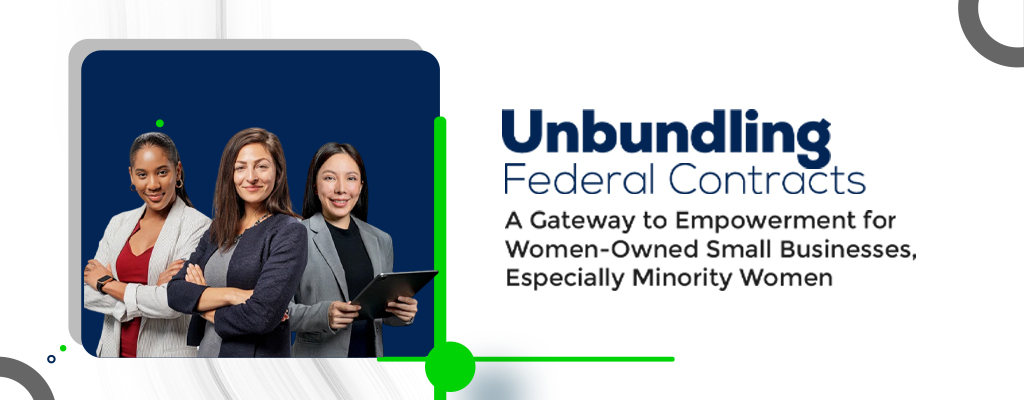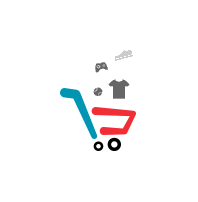
Navigating the Landscape of Women-Owned Small Business Government Contracting: Challenges, Opportunities, and Strategies for Success
Navigating the Landscape of Women-Owned Small Business Government Contracting: Challenges, Opportunities, and Strategies for Success
In recent years, there has been a growing emphasis on supporting women-owned small businesses (WOSBs) in government contracting. While the federal government has made strides in prioritizing small businesses, particularly through initiatives like the Women-Owned Small Business (WOSB) and the Economically Disadvantaged Women-Owned Small Business (EDWOSB) programs, there are still significant challenges that women entrepreneurs face in accessing government contracts. Despite efforts to increase spending with WOSBs, many women business owners feel overlooked and underserved by federal contracting initiatives. We want to consider a high-level snapshot into the current state of women-owned small business government contracting, explore some of the challenges they encounter while also highlighting some opportunities for improvement, and outline some actionable strategies for success.
The federal government's commitment to supporting small businesses is evident in its allocation of nearly $163 billion in contracts to small businesses in FY 2022. However, it fell short of its goal to spend 5% of total federal contracting dollars on WOSBs. The Biden administration has introduced new programs and policies aimed at increasing access to small business government contracts, with a particular focus on supporting disadvantaged businesses. Despite these efforts, women entrepreneurs continue to face hurdles in accessing government contracts, exacerbated by the challenges brought about by the COVID-19 pandemic.
Challenges Faced by WOSBs:
A recent survey by Goldman Sachs' 10,000 Small Businesses Voices program revealed that 99% of women-owned businesses believe that the federal government has not done enough to support them. The data is abundantly clear and screams for more to be done. Many women entrepreneurs feel that they are not on a level playing field with their male counterparts and express frustration at being shut out of funding and contracts. One significant barrier is the cumbersome and time-consuming process of obtaining certification as a WOSB through the Small Business Administration (SBA). Only 36% of surveyed businesses were certified, with many citing difficulties and questioning the value of the certification process.The certification process requires businesses to provide extensive documentation and undergo rigorous scrutiny to demonstrate their eligibility. However, despite the potential benefits of certification, such as access to set-aside contracts and procurement preferences, many women entrepreneurs question the value of the certification process. Only 36% of surveyed businesses were certified, with many citing difficulties and bureaucratic hurdles associated with the certification process.
Moreover, women-owned businesses have experienced an overall decline in federal contracting opportunities, with a 6% decrease in the number of primary contractors from fiscal year 2020 to 2021. These challenges are further compounded by systemic issues such as contract bundling, which disproportionately affects women-owned firms and limits their access to opportunities.
The Impact of the COVID-19 Pandemic:
The COVID-19 pandemic has brought about unprecedented challenges for businesses worldwide, and women-owned small businesses (WOSBs) in government contracting have been particularly hard-hit. According to a report by the National Bureau of Economic Research, in April 2020 alone, the number of working women business owners dropped by a staggering 25%. This sharp decline reflects the severe economic repercussions of the pandemic on women entrepreneurs, many of whom operate in sectors heavily affected by lockdowns and social distancing measures.
The pandemic-induced economic downturn has disproportionately impacted women-owned businesses, further widening existing disparities in access to government contracts. Women entrepreneurs, especially those in minority communities, have faced heightened barriers to sustaining their businesses amidst the economic turmoil caused by the pandemic. The disruption in supply chains, reduced consumer demand, and constraints on business operations have significantly affected the ability of WOSBs to compete for and secure government contracts.
Furthermore, the rollout of relief programs such as the Paycheck Protection Program (PPP) presented additional challenges for WOSBs. While the PPP was intended to provide critical financial support to businesses struggling to cope with the economic fallout of the pandemic, many WOSBs faced obstacles in accessing these forgivable loans. Issues such as limited access to banking relationships, complex application processes, and discriminatory lending practices disproportionately affected WOSBs, leaving many without vital financial lifelines to sustain their businesses.
The challenges posed by the COVID-19 pandemic have underscored the urgent need for targeted support and interventions to assist women-owned small businesses in navigating the unprecedented economic landscape. As the federal government continues to implement recovery efforts and support initiatives, addressing the unique needs of WOSBs must be prioritized to ensure their resilience and long-term viability in the government contracting sector.
Strategies for Success:
Despite these challenges, there are strategies that WOSBs can employ to navigate the government contracting landscape more effectively. Staying informed about market trends and regulatory changes is crucial for success. Additionally, pursuing certification as a WOSB opens doors to set-aside federal contracts that are exclusively available to women-owned businesses. While the certification process may be arduous, it can significantly enhance a company's competitiveness in the government contracting arena.
Furthermore, advocating for policy reforms and reauthorization of the SBA is essential for addressing systemic barriers faced by WOSBs. By engaging with policymakers and stakeholders, women entrepreneurs can contribute to shaping more inclusive and equitable government contracting practices. Initiatives such as the unbundling of contract requirements can create opportunities for WOSBs, particularly those owned by minority women, by eliminating barriers related to capital access and specialization.
In conclusion, while there have been efforts to support women-owned small businesses in government contracting, significant challenges persist. Women entrepreneurs continue to face barriers in accessing contracts, hindering their ability to compete on a level playing field. However, by leveraging resources, advocating for policy reforms, and actively participating in the certification process, WOSBs can position themselves for success in the government contracting market. As the federal government seeks to promote diversity and inclusion in its procurement practices, addressing the needs of women-owned businesses must remain a priority to foster economic growth and innovation.By staying informed, pursuing certification, advocating for policy reforms, engaging in strategic partnerships, investing in professional development, and leveraging technology, women entrepreneurs can enhance their competitiveness and seize opportunities in the government contracting market. As the federal government continues to prioritize diversity and inclusion in its procurement practices, addressing the needs of WOSBs remains essential for fostering economic growth, innovation, and entrepreneurship.





